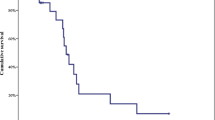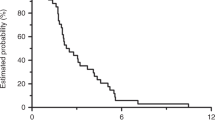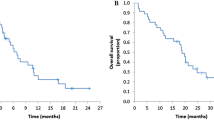Abstract
Introduction
Irinotecan has an important place in the treatment of metastatic colorectal cancer. It was initially administered as monotherapy, but is now generally used in combination with 5-fluorouracil or targeted therapies (cetuximab or bevacizumab), with various doses.
Methods
We here review the main studies assessing irinotecan doses escalation, and discuss the potent advantages of this escalation.
Results
Several studies have demonstrated a dose–intensity relationship for irinotecan, and high doses (up to 600 mg/m2 as monotherapy, 260 mg/m2 in combination therapy) have been used with satisfactory safety and higher objective response rates. It is possible that, in practice, some patients receive insufficient doses of irinotecan. Dose escalation could be considered in carefully selected patients: young patients with a good performance status and normal liver function. This approach could be useful in patients with liver metastases, which may become resectable in the case of a major tumour response. It is wise to perform UGT1A1 genotyping prior to dose escalation to detect patients at high risk of toxicity (genotype 7/7). The role of another laboratory parameter, which needs to be evaluated is the KRAS status of the tumour. A KRAS mutation confers resistance to cetuximab, which reduces treatment options, especially in first-line. However, in the CRYSTAL trial comparing FOLFIRI to FOLFIRI-cetuximab as first-line therapy, the presence of a KRAS mutation did not appear to influence the efficacy of FOLFIRI. The value of irinotecan dose escalation needs to be determined in this setting.
Conclusion
Irinotecan dose escalation is potentially of interest in highly selected patients, but this concept is only based on phase I or II trials and must be validated by a randomized trial. Its value regarding other regimens such as FOLFIRINOX or combinations with targeted therapies also needs to be determined.
Similar content being viewed by others
References
Abigerges D, Chabot GG, Armand JP, Herait P, Gouyette A, Gandia D (1995) Phase I and pharmacologic studies of the camptothecin analog irinotecan administered every 3 weeks in cancer patients. J Clin Oncol 13:210–221
Ando M, Hasegawa Y, Ando Y (2005) Pharmacogenetics of irinotecan: a promoter polymorphism of UGT1A1 gene and severe adverse reactions to irinotecan. Invest New Drugs 23:539–545. doi:10.1007/s10637-005-4022-6
Cunningham D, Pyrrhonen S, James RD et al (1998) Randomised trial of irinotecan plus supportive care versus supportive care alone after fluorouracil failure for patients with metastatic colorectal cancer. Lancet 352:1413–1418. doi:10.1016/S0140-6736(98)02309-5
Cunningham D, Humblet Y, Siena S et al (2004) Cetuximab monotherapy and cetuximab plus irinotecan in irinotecan-refractory metastatic colorectal cancer. N Engl J Med 351:337–345. doi:10.1056/NEJMoa033025
Di Fioré F, Blanchard F, Charbonnier F et al (2007) Clinical relevance of KRAS mutation detection in metastatic colorectal cancer treated by Cetuximab plus chemotherapy. Br J Cancer 96:1166–1169. doi:10.1038/sj.bjc.6603685
Di Fioré F, Van Cutsem E, Laurent-Puig P, et al. (2008) Role of KRAS mutation in predicting response, progression-free survival, and overall survival in irinotecan-refractory patients treated with cetuximab plus irinotecan for a metastatic colorectal cancer: analysis of 281 individual data from published series. Proc am Soc Clin Oncol. J Clin Oncol 26(suppl):abstr 4035
Douillard JY, Cunningham D, Roth AD et al (2000) Irinotecan combined with fluorouracil compared with fluorouracil alone as first-line treatment for metastatic colorectal cancer: a multicentre randomised trial. Lancet 355:1041–1047. doi:10.1016/S0140-6736(00)02034-1
Ducreux M, Ychou M, Seitz JF et al (1999) Irinotecan combined with bolus fluorouracil, continuous infusion fluorouracil, and high-dose leucovorin every two weeks (LV5FU2 regimen): a clinical dose-finding and pharmacokinetic study in patients with pretreated metastatic colorectal cancer. J Clin Oncol 17:2901–2908
Ducreux M, Köhne CH, Schwartz GK, Vanhoefer U (2003) Irinotecan in metastatic colorectal cancer: dose intensification and combination with new agents, including biological response modifiers. Ann Oncol 14(Suppl 2):17–23. doi:10.1093/annonc/mdg724
Ducreux M, Raoul JL, Marti P et al (2008) High-dose irinotecan plus LV5FU2 or simplified LV5FU (HD-FOLFIRI) for patients with untreated metastatic colorectal cancer: a new way to allow resection of liver metastases? Oncology 74:17–24. doi:10.1159/000138352
Duffour J, Gourgou S, Desseigne F et al (2007) Multicentre phase II study using increasing doses of irinotecan combined with a simplified LV5FU2 regimen in metastatic colorectal cancer. Cancer Chemother Pharmacol 60:383–389. doi:10.1007/s00280-006-0372-9
Goldberg RM, Erlichman C (1998) Irinotecan plus 5-FU and leucovorin in advanced colorectal cancer: North American trials. Oncology 12:59–63
Innocenti F, Undevia SD, Iyer L et al (2004) Genetic variants in the UDP glucuronosyltransferase 1A1 gene predict the risk of severe neutropenia of irinotecan. J Clin Oncol 22:1382–1388. doi:10.1200/JCO.2004.07.173
Lièvre A, Bachet JB, Boige V et al (2008) KRAS mutations as an independent prognostic factor in patients with advanced colorectal cancer treated with cetuximab. J Clin Oncol 26:374–379. doi:10.1200/JCO.2007.12.5906
Merrouche Y, Extra JM, Abigerges D et al (1997) High dose-intensity of irinotecan administered every 3 weeks in advanced cancer patients: a feasibility study. J Clin Oncol 15:1080–1086
Rivoire M, Thezenas S, Rebischung C, et al. (2008) Preliminary results of a randomized phase II trial comparing standard bi-therapy versus three intensified chemotherapy regimens as treatment for patients with non resectable liver metastases from colorectal cancer (METHEP). Proc Am Soc Clin Oncol. J Clin Oncol 26(suppl):absr 4075
Roth AD, Yan P, Dietrich D, et al. (2008) Is UGT1A1*28 homozygosity the strongest predictor for severe hematotoxicity in patients treated with 5-fluorouracil-irinotecan? Results of the PETACC 3 - EORTC 40993 -SAKK 60/00 trial comparing IRI/5-FU/folinic acid to 5-FU/FA in stage II-III colon cancer patients. Proc Am Soc Clin Oncol. J Clin Oncol 26(suppl):abstr 4036
Rougier P, Van Cutsem E, Bajetta E et al (1998) Randomised trial of irinotecan versus fluorouracil by continuous infusion after fluorouracil failure in patients with metastatic colorectal cancer. Lancet 352:1407–1412. doi:10.1016/S0140-6736(98)03085-2
Saltz LB, Cox JV, Blanke C et al (2000) Irinotecan plus fluorouracil and leucovorin for metastatic colorectal cancer Irinotecan Study Group. N Engl J Med 343:905–914. doi:10.1056/NEJM200009283431302
Van Cutsem E, Dirix L, Van Laethem JL et al (2005) Optimisation of irinotecan dose in the treatment of patients with metastatic colorectal cancer after 5-FU failure: results from a multinational, randomised phase II study. Br J Cancer 92:1055–1062. doi:10.1038/sj.bjc.6602462
Van Cutsem E, Lang I, D’Haens G, et al. (2008) KRAS status and efficacy in the first-line treatment of patients with metastatic colorectal cancer treated with FOLFIRI with or without cetuximab: the CRYSTAL experience. Proc Am Soc Clin Oncol. J Clin Oncol 26(suppl):abstr 2
Ychou M, Raoul JL, Desseigne F et al (2002) High-dose, single-agent irinotecan as first-line therapy in the treatment of metastatic colorectal cancer. Cancer Chemother Pharmacol 50:383–391. doi:10.1007/s00280-002-0506-7
Author information
Authors and Affiliations
Corresponding author
Rights and permissions
About this article
Cite this article
Hebbar, M., Ychou, M. & Ducreux, M. Current place of high-dose irinotecan chemotherapy in patients with metastatic colorectal cancer. J Cancer Res Clin Oncol 135, 749–752 (2009). https://doi.org/10.1007/s00432-009-0580-x
Received:
Accepted:
Published:
Issue Date:
DOI: https://doi.org/10.1007/s00432-009-0580-x




